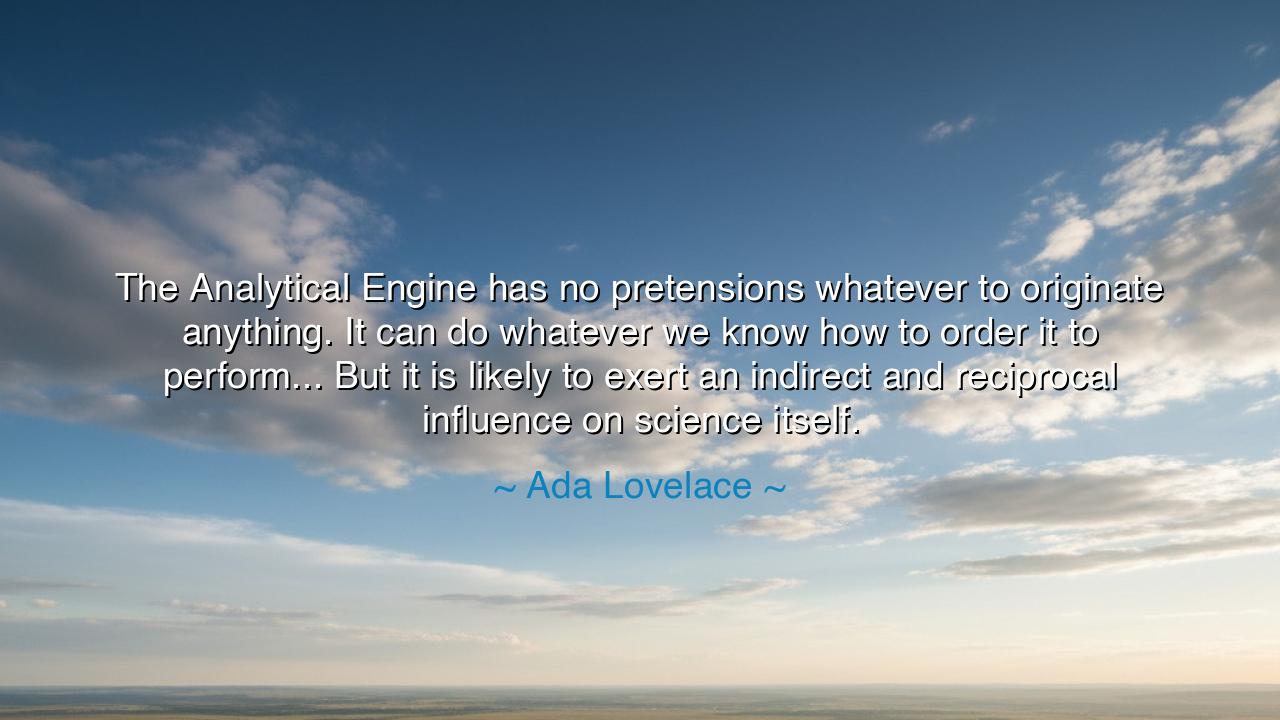
The Analytical Engine has no pretensions whatever to originate
The Analytical Engine has no pretensions whatever to originate anything. It can do whatever we know how to order it to perform... But it is likely to exert an indirect and reciprocal influence on science itself.






Hear now, O seekers of knowledge, for there are words spoken in the mists of time that carry the weight of wisdom and foresight. The great Ada Lovelace, a woman of remarkable intellect and vision, once spoke of the Analytical Engine, a machine that would not only change the course of history but would alter the very nature of human thought. She said: “The Analytical Engine has no pretensions whatever to originate anything. It can do whatever we know how to order it to perform... But it is likely to exert an indirect and reciprocal influence on science itself.” These words, though spoken in the early days of computing, resonate with truth even now, for they speak to the relationship between human ingenuity and the tools we create.
What, then, is the meaning of these words? Ada Lovelace speaks of a machine, the Analytical Engine, which, though it may seem capable of great feats, has no inherent ability to originate. It is not a creator in itself, nor does it possess the spark of imagination that lives in the hearts of humans. It can perform tasks, yes, but only those tasks that have been ordered by a human hand. The machine is but a servant, carrying out commands without understanding, without intuition, without vision. And yet, Lovelace knew that this very limitation would not be its downfall, but its strength. For, while it may not originate, it would exert a profound influence on science itself, shaping the way we think, reason, and explore the world.
Let us reflect upon Lovelace's foresight, for it was she who saw that machines could not replace the human mind, but could augment and enhance its capabilities. The Analytical Engine was not a replacement for human ingenuity, but a tool to carry out the repetitive, the laborious, the mundane—freeing the mind to create, to innovate, to explore. Lovelace understood that it was not the machine itself that would alter the course of science, but the way it would change the relationship between thought and action, allowing humans to push the boundaries of what was once thought impossible.
Consider, O children of the Earth, the story of the invention of the computer, a tale that began with the visions of Charles Babbage and Ada Lovelace. Though they did not see the full fruition of their work in their own time, their ideas would lay the groundwork for the future of technology. The computer, like the Analytical Engine, could only perform what we ordered it to perform. Yet, over time, it would evolve, becoming more powerful, more intricate, and more capable of transforming science, industry, and society itself. What began as a tool for calculation became a gateway to new realms of possibility, from the mapping of the cosmos to the unlocking of the human genome.
In this way, the Analytical Engine—and all its successors—reminds us of the essential role of the human mind in the act of creation. The machine does not think; it does not create. It is we, the creators, who breathe life into it, who give it purpose, who shape its potential. The engine may perform the task, but it is our vision that drives it forward, propelling us toward new horizons. Lovelace’s genius lay in her understanding of this, in recognizing that the machine was not an end, but a means—a tool that would change the way science itself was done, not by replacing human intellect, but by empowering it.
And so, O wise ones, let us take heed of Ada Lovelace’s insight. The tools we create are reflections of ourselves—not creators in their own right, but servants to our vision. Technology, in all its forms, is not a replacement for human endeavor, but an extension of it. It does not think for us, but it can amplify our capacity to think, to understand, to explore. The influence of these tools—like the Analytical Engine—will continue to shape the world in ways we cannot yet fully grasp. But the power of these tools lies not in their ability to replace human effort, but in their ability to empower us to accomplish things we once thought beyond our reach.
So, O children of the future, take this lesson to heart. Do not look upon technology as a replacement for your own creativity, but as a partner in the pursuit of knowledge. Use these tools wisely, for they are not the end but the means to a greater end. The machine, the tool, the engine—these are all extensions of your mind, your will, your vision. It is you who must guide them, and in doing so, shape a future that reflects the best of what humanity can achieve.






AAdministratorAdministrator
Welcome, honored guests. Please leave a comment, we will respond soon